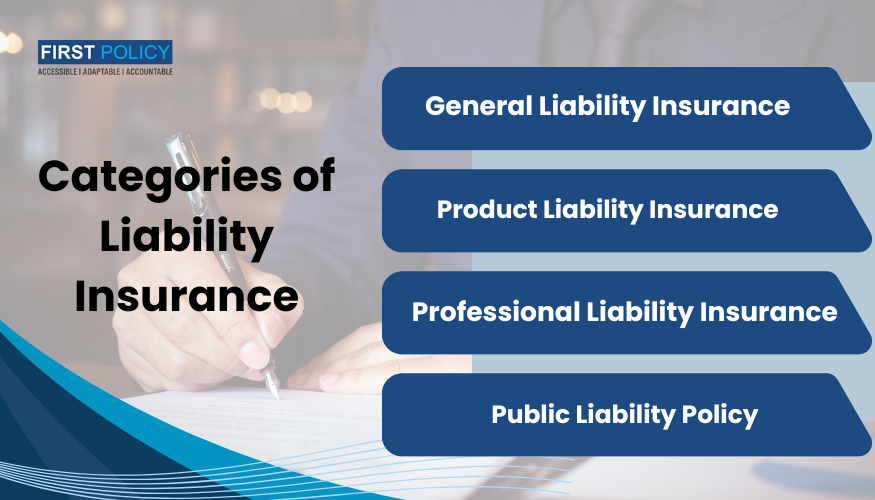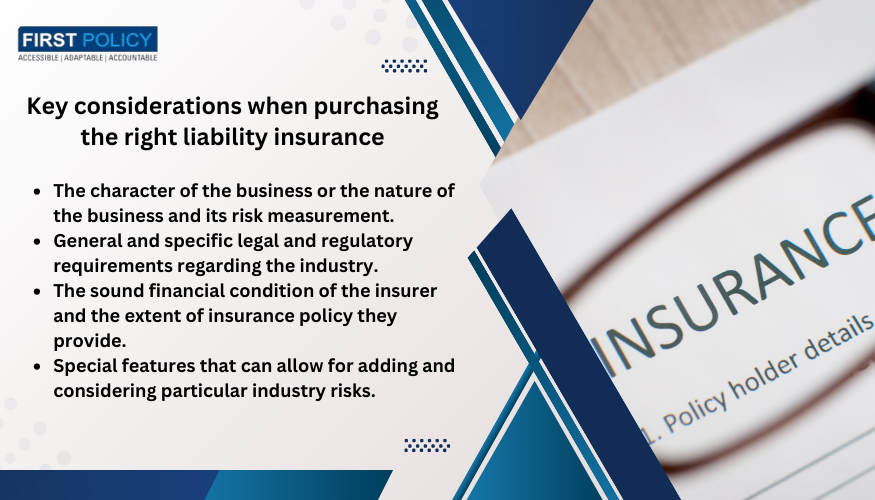
A Comparative Study of Liability Insurance Policies Across Different Industries
In the current complex and globalized environment, liability insurance remains one of the most important means to minimize the risks of financial losses in connection with possible legal actions. This is true because all industries have their challenges and therefore the liability insurance policies available are unique to the industries’ risk factor. The differences in the relevance and coverage of the major kinds of liability insurance policies are explored in this blog. Some of the coverages of an insurance policy discussed are product and liability insurance, product liability insurance policy and public liability policy.

Understanding Liability Insurance
Legal liability is insurance for protection against costs that arise from legal cases of injuries and damages to people or property for which the insured is legally accountable for. Broadly, it includes several categories such as:
General Liability Insurance: A type of coverage that protects against claims for third-party physical harm or property within the insured’s premises or as caused by the business.
Product Liability Insurance: Covers organizations against legal actions which may emerge because of defective goods that has led to harm or injury.
Professional Liability Insurance: Concerned with a breach of duty through negligent or careless acts, the provision of detrimental advice and omitting vital information.
Public Liability Policy: Principally deals with third party physical or property injury or damage arising out of business operations or on the business premises.
Importance of Product and Liability Insurance Across Industries
1. Manufacturing Industry
The business industry in general, specifically the manufacturing sector, is highly exposed to liability risks connected to faulty or impaired products. In order to avoid these risks, a strong product liability insurance policy should be taken. For example, if a faulty electrical gadget endangers a consumer, the producer might have viable law suits for compensation.
In such cases, product and liability insurance provides for costs of defense legal fees as well as claims and any award or settlement made thus protecting the business financially and structurally. Public liability is also engaged for accident such as to third party during factory visit or expenses due to emissions.
2. Retail and E-commerce
Even traditional and/or online shop owners that do not have a direct input in the production of the products that they sell can also be sued for any harm that results from the products they sell. In this case, a product liability insurance policy will help a policyholder cover his or her liability insurance related to faulty commodities.
Furthermore, public liability is important for real business outlets to manage risks including trips and falls on customer claims within the premises.
3. Construction and Real Estate
The nature of construction work involve risk which emanate from the activities of contractors who engage in executing their projects that involve handling heavy and complex machineries, working with hazardous substances and performing tasks which physically demand hard work. Contractors and the builders require public liability to handle cases regarding the events which occur at the construction site, including injuries of people passing by or the harm caused to other properties.
Further, construction equipment manufacturers or construction material suppliers usually need the product and liability insurance to mitigate claims associated with defective equipment or materials which led to accidents at the construction site.
4. Pharmaceutical and Health Care
Some of the specific issues that pharmaceutical firms and healthcare organizations experience increased regulatory attention include product risks, safety and efficacy of products. Product liability insurance plan is indispensable for addressing the claims which are relevant to the side effects of drugs or medical devices.
Likewise, hospitals & clinics also require Public liability for accidents like slipping, falling or any injuries that might occur on the hospital or clinic premise or due to a wrong functioning of equipment.
5. Food and Beverage Industry
Maintenance of product liability is also important in the food and beverage sector where risk include products which are unsafe for consumption such as contaminated food or drinks. An improperly labeled product, or one which is faulty in some way, can have disastrous results – including legal action, product recalls and loss of face.
Public liability is also important for restaurant and catering businesses to deal with claims arising from injury to the clients such as burns or allergy complications on the premises.
6. Technology and Electronics
In the tech industry, the risks are more or less general that something wrong with the hardware or software endangers the user’s health, property or money. A product liability insurance policy would help companies defend themselves against claims related to defective gadgets or systems resulting to properties damage, personal injuries or cyber attacks .
Public liability is somewhat rare in this sphere, but can be given to physical occurrences in offices or stores.
Comparative Analysis of Liability Insurance Policies
Coverage Scope
Whereas product and liability insurance are the insurance cover that covers good or service risks a public liability policy is the insurance cover that addresses all third-party claims which are not related to a particular product. Each industry implements these policies depending on the operational risk inherent to them.
For instance:
- The industries of manufacturing and pharmaceutical appreciate and opt for product liability insurance policies because of the more risk level associated with a defective product.
- Public liability policies are preferred by the retail, construction and hospitality businesses because such industries have a higher probability of accidents occurring on the business premises involving customers or other visitors.
Premium Costs
Different industries tend to witness overall variation in the cost of liability insurance premiums. Larger industries and those involved in risky activities such as production of pharmaceuticals, builders and manufacturers tend to pay higher premiums as they are likely to face heart-compromising cases. Relative costs have reduced primarily due to improvement in the technology and in general, retail and technology industries have lower premiums though not without exceptions depending on volume and product related risks.
Legal and Regulatory Compliance
In some industries, carrying out liability insurance is not only prudent economics but also the law of the land. For example:
- This is because the food businesses may require product and liability insurance so as to meet the set safety compliance.
- To be allowed to work on associated large projects, construction firms may have to put in place public liability policies in place.
Claims Frequency and Severity
These sectors experience a small number of claims but severe ones since faulty products result in advanced life changes. Retail and hospitality industries are the ones that experience more often but less severe claims. Usually, the claims originating from those fields are connected with accidents of a minor degree.
Liability Insurance: Making the Right Decision
Purchasing the right liability insurance has significant challenges like checking the operational exposures, legal requirements and affordability of the potential risks. Yet where product and liability insurance targets sectors related to manufacturing or its sale of products, public liability policy is paramount to business engaging customers or the public.

Key considerations include:
- The character of the business or the nature of the business and its risk measurement.
- General and specific legal and regulatory requirements regarding the industry.
- The sound financial condition of the insurer and the extent of insurance policy they provide.
- Special features that can allow for adding and considering particular industry risks.
Conclusion
Therefore, it is very important to understand that liability insurance policies are not ready made solutions. Every industry has its risks which requires specific strategy to be adopted in management of risks. Product and liability insurance, product liability insurance policies, as well as public liability policies are important legal concepts that require a working knowledge to help a business overcome legal hurdles.
This means that companies can prepare for the risks that may come up in their operations by acquiring the right liability coverage; save on their reputation when things go wrong; and be able to work on their strategies for growth and product and services innovations without worrying about the legal and financial consequences of lawsuits.





